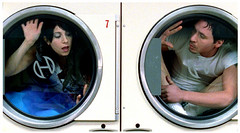
2005/03/01
Numbers LifeIn 212, screenwriter/director Anthony Ng brings Hong Kong style romance to the screen via New York. There are three stories here: Vincent (Ajay Naidu) and Lana (Priscilla Garita) - a failing romance, Antonio (Johnny Sanchez) and Ama (Michelle Luchese) - a budding romance after a heartbreak, and Viv (Catherine Zambri) and Seth (Brian Gant) - a budding romance cloaked in awkwardness and fantasy.
SPOILER ALERT! Don't read further if you'd prefer to remain surprised.
The film starts with Viv and Seth meeting in a laundromat. Seth has a distinctive quirk to his handling of laundry. He purposefully (and loudly!) turns all his wet clothes inside-out before putting them in the dryer. Viv watches him with some curiosity and a lot of amusement. They talk briefly and Viv comes into Seth's work, he asks her out and time is spent watching him get ready. He's obviously excited about the meeting, but his watch breaks and he's late. Viv leaves their meeting place, visibly upset that she may have been stood up. There is a moment of awkwardness as she goes back to his work and asks for the $1 he had borrowed at the laundromat - they're embarrassed and it's obvious that she wants to accept his apology as much as he wants to apologize. Instead in her awkwardness she makes up an elaborate story about traveling through Europe. So begins their courtship via her sending him audio cassette tapes through her "roommate" and her elaborate stories of traveling through Europe and the people she meets. Of course she is still in NYC and at parts she stalks him, so he's laughing while listening to the cassette tapes and she's there in the background with sunglasses and a newspaper. Seth begins missing the physical Viv and just when the audience and Viv think he's gone to Europe as well - he's walks into the laundromat and finds her there.
The second story of Vince and Lana is the most tragic. Vince lives with his mostly disinterested girlfriend Lana, who can't seem to spend face time with him, even though they're sitting next to each other on the couch. This is shown through scenes and scenes of her on her cellphone, as he tries to talk to her. At one point, she leaves in the middle night because she receives a call. The audience is made aware how close they are to the end of their relationship. Vince has a secondary story of his crush on a girl in a photo (he works at a photo developer) who hasn't picked up her photos. Oddly/randomly he's in one of the photos she's taken, he's fascinated by her looks and the possibility of her story. This vignette gets the least time, but feels the most heart-wrenching. Their everyday consists of non-communication or small quibbles. The audience knows the outcome of the story and it is all a matter of when, which makes it slightly uncomfortable to watch. We aren't disappointed after Vince gets a call from Lana saying she wants to talk and he rushes home, as he pauses at the door of the apartment, the screen goes to black.
The third story is that of the girl in the photo, Ama a copymat employee, who has a broken heart and a broken copier. One night she calls for a repairman to come in and Antonio with his limited English is sent to fix it. Ama is soon breaking more and more items so that Antonio can come down and fix things while she works. At one pivotal moment in their arc, she is reading a book about how to get over a broken heart and she asks Antonio, "what else can you fix?" The moment is pregnant with expectation as the thought, flashes, "broken hearts" - before he replies that he can fix VCRs, toasters, and goes on to name most small appliances. It was particularly clever of Ng to include that moment in for the viewer. In fact the sweetest story is that of Ama and Antonio. At the end, after a night of finally eating together, they are shown taking the subway together and falling asleep on each other's shoulders. It is a pure sweet moment, pure WKW and filmed just as Doyle would have.
An interesting aspect of this movie is the lack of modern day technology. There is a marked lack of use or reference to modern day conveniences. Suspension of disbelief needs to be taken liberally. For instance: why didn't Seth call Viv on her cell when he was running late or use the time on his cell to see the real time? Also why didn't Viv e-mail Seth her stories in Europe, or if talking was needed, audioblog it? The also very analog places that the characters work, a copymat, photo processor and a travel agency without a computer? These places seem quaint in the wake of modernity, they seem deliberately anachronistic in the 21st century. My guess is Ng didn't set out to deliberately make a statement about modern convenience, or recent inconvenience, but I noticed it nonetheless and because of that it felt fantasy-like. (Which given the context, makes sense.)
The movie at its best is an indie movie shown through eyes with simplicity and rawness, using the skills of the actors facial expressions, the lighting, art direction, and cinematography to tell the story of three couples in the 212 area code without being laden with hip-jargon. At its worst it is a WKW/Doyle rip-off, but I'm going to go with the former statement. Ng has done what all movies should, transported an aesthetic, but made it accessible for its intended audience. He was also able to do the film with the wonderfully understated acting without the annoying story voiceover that WKW always uses. A gorgeous movie.Comments: Post a Comment



